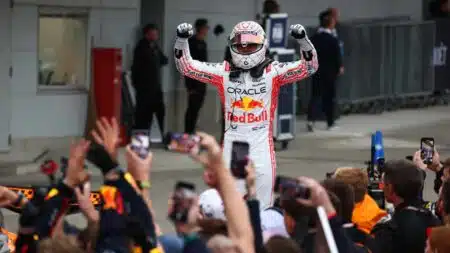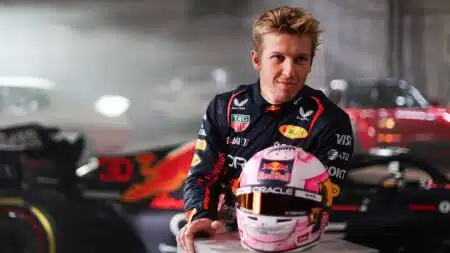
F1 snore-fest shows new cars badly needed: Up/Down Japanese GP
The 2025 Japanese GP showed a much more extreme change than next year's technical regulations is needed to make racing at classic F1 tracks interesting
Audi’s new hybrid e-tron quattro racer scored a resounding victory in the 80th running of the Le Mans 24 Hours as Benoit Treluyer, Marcel Fassler and Andre Lotterer scored their second consecutive win in the great enduro.
The trio beat veterans Tom Kristensen, Allan McNish and Dindo Capello in the sister e-tron to deliver Audi a perfect result for its new diesel hybrid racer.
Toyota gave its own hybrid, the petrol-fuelled TS030, a race debut as the marque returned to sports cars as a factory force for the first time since 1999. The Japanese will be heartened by a very promising race debut for the car, which more than delivered on expectations. While the TS030 couldn’t quite match Audi’s R18 for stint length, running consistently a lap shorter, there was little lacking in terms of pace.
But whether Toyota could have beaten Audi over 24 hours and defied conventional thinking by running without trouble first time out is a moot point. Within two racing laps, albeit separated by an hour and a quarter, its race unravelled.
At 8pm on Saturday night Nicolas Lapierre had caught Treluyer’s leading e-tron quattro and the pair went wheel to wheel in a thrilling duel for the lead. But as they swapped positions twice during the lap, the cameras switched to the aftermath of a huge accident at Mulsanne Corner.
Davidson’s TS030 had dived down the inside of Pierguiseppe Perazzini’s Ferrari in the kink before the tight right-hander, but the Italian failed to spot the faster car and contact was made. The Toyota slewed sideways, then took off and flipped before landing heavily the right side up and slamming into the tyre barrier. Perazzini also hit the barrier with violent force, the Ferrari ending up on its roof.
As the amateur emerged unscathed, Davidson waved for help as he tried to clamber out of his car, then slumped back. After a worrying wait, it emerged he had suffered two broken vertebrae and was tweeting from his hospital bed before the race was through. It could have been much worse.
The race ran under a safety car for the next hour and a quarter as the damaged barriers were repaired, and when the race restarted at 9.15pm there was immediately further drama.
Kazuki Nakajima had taken over from Lapierre in the surviving Toyota, but as he fought to take the lead from the no 1 Audi he ran the experimental ‘Garage 56’ Delta Wing off the track out of the Porsche Curves. Poor Satoshi Motoyama could do nothing as the innovative racer, which had won everyone’s respect during both practice and the race this week, slammed side-on into a concrete wall. Motoyama heroically worked to get the car moving and return it to the pits, but eventually had to accept defeat.
Nakajima headed for the pits with a puncture and rear bodywork damage, then had to pit again for a new alternator. After a very long stop, the car returned to the track only for its engine to fail. Toyota’s valiant Le Mans challenge was over – until next year.
Audis now ran 1-2-3, but any fears of a dull demonstration run to the flag could be dismissed. Thankfully, Dr Ullrich likes his drivers to race – and so they don’t hold back.
The no 2 e-tron quattro of McNish, Kristensen and Capello had been delayed early on by a handling imbalance caused by rubber marbles collecting around the rear suspension, but by midnight the veterans had plugged away and were running second, a lap down on their team-mates Treluyer, Fassler and Lotterer.
But deep into the night a spin for Fassler meant the battle was on. A further incident at 8am, when Fassler damaged his rear bodywork trying to avoid Tommy Milner’s spinning Corvette, gave the veterans the advantage. But Marcel charged back and caught Kristensen. At 9am he attempted to take the lead, only to dramatically slither into the gravel.
From there, the lead switched between the pair as they made out-of-sequence pitstops. There was little in it as they raced through the morning.
Just before noon, Treluyer was delayed by a spin as he approached the pitlane speed limit line, but it would be McNish who would make the vital race-deciding mistake. At 12.12pm he spun off at the Porsche Curves as he tried to lap a GT car and hit the barriers, removing the nose from his R18. He got going and headed for the pits, as the safety car was called to allow his debris to be cleared. Advantage Treluyer. At the restart, Treluyer held a lap’s advantage and the battle was over.
The first of the non-hybrid Audi Ultras driven by Briton Oliver Jarvis, Marco Bonanomi and Mike Rockenfeller enjoyed the least dramatic race of the German cars, the youngest crew showing great maturity to complete the podium behind the hybrid duo.
The sister ultra finished fifth after remarkably enduring identical twin accidents, at exactly the same place on the track. Approaching 7.40pm on Saturday night, Romain Dumas slithered into a tyre barrier at the first chicane on the Mulsanne as he followed a Porsche GTE car. He scrambled out and valiantly ripped the damaged bodywork from the nose of his car, then nursed the R18 all the way back to the pits, despite a very wobbly right-front wheel. After long repairs, the car returned to the track and the crew put in a strong recovery through the night.
By the morning the no 3 car had latched on to the back of the Audi train, to make it a 1-2-3-4. But then at 12.05pm, just before McNish would make his costly error, Marc Gene nosed the ultra into the tyres at exactly the same spot where Dumas had gone off. Again, the car was nursed back to the pits for repairs, losing less time than it might thanks to the safety car period introduced for McNish’s incident.
Best of the non-works cars was the Rebellion Lola of Neel Jani, Nick Heidfeld and Nicolas Prost (below), which ran quickly and reliably to fourth place and victory in the unofficial ‘best of the rest’ class, splitting the four Audis. The JRM HPD-Honda of David Brabham, Peter Dumbreck and Karun Chandhok completed the top six, ahead of the LMP2 class winner. Those secondary prototype honours were claimed by Starworks Motorsport, the American team making a brilliant Le Mans debut with Britons Ryan Dalziel, Tom Kimber-Smith and Venezualan Vicente Potolicchio sharing the driving.
Typically, GTE was hard fought, with Aston Martin taking on Corvette and Ferrari. The ’Vette of Oliver Gavin, Richard Westbrook and Tommy Milner fought off an early challenge from the Prodrive-run Vantage, then looked well set for victory.
But disaster struck in the 11th hour when Westbrook lost a wheel directly after a pitstop. He nursed the car back over almost an entire lap, losing all hopes of the class victory. Later, further problems with the floor and diffuser required almost a total rebuild of the car. Then Milner collided with Fassler, and suffered a further crash later on which he blamed on cold tyres.
Corvette’s woes allowed AF Corse’s Ferrari 458 Italia (above) to claim GTE honours, with Giancarlo Fisichella, Gianmaria Bruni and Toni Vilander taking the win.

The 2025 Japanese GP showed a much more extreme change than next year's technical regulations is needed to make racing at classic F1 tracks interesting

Max Verstappen looks set to be pitched into a hectic, high-stakes battle for F1 victories in 2025, between at least four teams. How will fans react if he resorts to his trademark strongman tactics?

Red Bull has a new team-mate for Max Verstappen in 2025 – punchy F1 firebrand Liam Lawson could finally be the raw racer it needs in the second seat

The 2024 F1 season was one of the wildest every seen, for on-track action and behind-the-scenes intrigue – James Elson predicts how 2025 could go even further